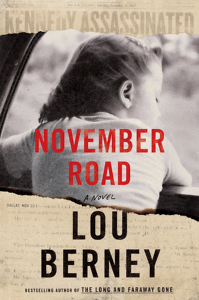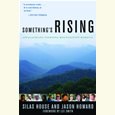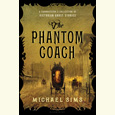Something More than Noir
The assassination of JFK launches Lou Berney’s new thriller
Among the twentieth century’s defining moments was the assassination of John F. Kennedy in Dallas. The event seared into historical memory some names that would otherwise have slipped into a sea of nothingness: the Texas School Book Depository, Abraham Zapruder, Lee Harvey Oswald. One name lurks along the assassination’s periphery: Carlos Marcello, the real-life New Orleans Mafioso whose reign of corruption and brutality set a gold-standard for crime bosses. The links remain tenuous, even for grassy-knoll conspiracy buffs. Did Marcello ever cross paths with Oswald in the Crescent City? Did he order Jack Ruby, a sleazy nightclub owner, to take out Oswald two days after the event?
 Against the backdrop of November 1963—Dealey Plaza, the pomp and circumstance of Kennedy’s funeral, the shooting of Oswald on live television, a National Day of Mourning—crime novelist Lou Berney spins November Road, a gripping tale of two lovers on the lam from very different threats. Frank Guidry, a Marcello henchman, lives a life straight out of pulp fiction: he’s a hard drinker with a huge sexual appetite, “so good in the sack that he’d banged the freckles right off a girl,” and not averse to cruelty in his hookups. At the beckoning of Seraphine, a Cajun floozy who serves as Marcello’s lieutenant, Frank drives an Eldorado from New Orleans to Dallas, parking it just blocks away from the Book Depository.
Against the backdrop of November 1963—Dealey Plaza, the pomp and circumstance of Kennedy’s funeral, the shooting of Oswald on live television, a National Day of Mourning—crime novelist Lou Berney spins November Road, a gripping tale of two lovers on the lam from very different threats. Frank Guidry, a Marcello henchman, lives a life straight out of pulp fiction: he’s a hard drinker with a huge sexual appetite, “so good in the sack that he’d banged the freckles right off a girl,” and not averse to cruelty in his hookups. At the beckoning of Seraphine, a Cajun floozy who serves as Marcello’s lieutenant, Frank drives an Eldorado from New Orleans to Dallas, parking it just blocks away from the Book Depository.
A week later, after hearing the news of the assassination, he realizes that the Eldorado might have been the assassin’s getaway car and that he may have helped to bring down a president. Frank knows Seraphine’s modus operandi is to eliminate anyone with connections to Marcello’s big projects. And in fact she has enlisted Barone, a vicious hit man, to track him down. With a bullseye on his back, Frank flees west, from Houston to Amarillo and across the desert Southwest. Destination: Los Angeles.
Meanwhile, in a small town in Oklahoma, Charlotte Roy, a housewife with two young daughters, responds to the assassination with her own escape—from marriage to a deadbeat alcoholic. She loads her children and the family dog into her car and heads west, as well, hoping to seek refuge with an aunt in Santa Monica. Charlotte is a stand-in for postwar conformity—“you met a man, you married the man, you stayed by his side until one of you died”—but beneath her June Cleaver exterior surges a magma of feeling: “Her love for her daughters defied understanding. Sometimes the sudden, unexpected detonation of it shook Charlotte from head to toe.” Her flight, then, mirrors the unhappiness found in Frank’s darker, urban world, where women drown their sorrows in dry martinis.
 Berney deftly cuts between his three leads as they careen in a perilous, cross-country chase, including details that beautifully capture the sullen existentialism beneath gleaming Space-Age America: Esso maps, off-the-grid hotels, picnics with crackers and Vienna sausages. Frank summons all his cunning to stay one step ahead of Barone, inevitably running across Charlotte in New Mexico. Amid the desert’s white glare he hatches a new scheme, deciding to recreate himself as “Frank Wainwright,” a Mad Men-style executive, and sets out to seduce Charlotte and use her and her girls as a front. His plan breaks down when he falls in love with Charlotte and the exotic notion of becoming a family man.
Berney deftly cuts between his three leads as they careen in a perilous, cross-country chase, including details that beautifully capture the sullen existentialism beneath gleaming Space-Age America: Esso maps, off-the-grid hotels, picnics with crackers and Vienna sausages. Frank summons all his cunning to stay one step ahead of Barone, inevitably running across Charlotte in New Mexico. Amid the desert’s white glare he hatches a new scheme, deciding to recreate himself as “Frank Wainwright,” a Mad Men-style executive, and sets out to seduce Charlotte and use her and her girls as a front. His plan breaks down when he falls in love with Charlotte and the exotic notion of becoming a family man.
Berney’s terse lines and dialogue hark back to the tradition of hardboiled crime, with affectionate homages to Hammett and Chandler and even the television series Dragnet: “Dolly would sell him out. Every human heart was rotten meat, but Dolly’s was more rotten than most” or “Seraphine was fond of Guidry, … but that and a nickel would get him one song on the jukebox.” Rather than triggering an eyeroll, the novel’s voice delights the ear. The age of petty criminals and Cold War paranoia is still a source of ironic amusement, but it also suggests larger forces at work, casting a net of danger.
November Road is more than just a period noir. While there’s gore aplenty, Berney’s adroit suspense and pacing propel the story forward. Frank is repulsive in his attitudes, especially toward women, but he’s also compelling as he plays a high-stakes game of mental chess with Seraphine. And with Charlotte he senses his one shot at changing his life. November Road succeeds as both well-wrought crime fiction and American parable, illuminating where we’ve been and where we’re going—toward the sunset, and fast.
 Hamilton Cain is the author of This Boy’s Faith: Notes from a Southern Baptist Upbringing and a finalist for a 2006 National Magazine Award. A native of Chattanooga, he lives with his family in Brooklyn, New York.
Hamilton Cain is the author of This Boy’s Faith: Notes from a Southern Baptist Upbringing and a finalist for a 2006 National Magazine Award. A native of Chattanooga, he lives with his family in Brooklyn, New York.


